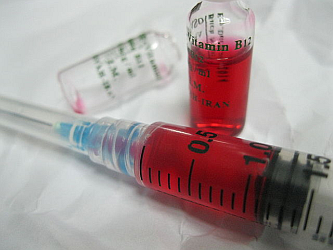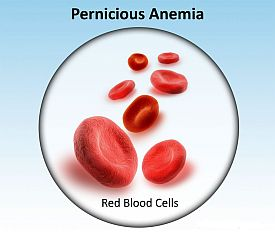Using B12 Injections to Treat Pernicious Anemia (PA)
How often should you take B12 injections to treat pernicious anemia?
Vitamin B12 injections are a great way to combat the condition, so it’s useful to understand how often you should take the vitamin in order to overcome pernicious anemia. People with the condition may require lifelong treatment, though this is as simple as taking regular B12 shots at home or in a doctor’s office. Self-injecting saves a bundle of money so it’s worth it to learn how.
Many medical professionals will suggest that you begin with injecting vitamin B12 into the muscle every day. After you have seen an improvement in symptoms from these daily injections, it is recommended that you use the shots once every 2 days for two weeks (this is 7 doses in total).
Finally, after it has been proven that your B12 levels have returned to a stable state the frequency of administration will be reduced to just one shot each month. Your doctor can check your B12 vitamin levels by taking a look at your blood count.
If you begin to experience symptoms of pernicious anemia after reducing your daily injection to a weekly or monthly shot, you may be advised to resume maintaining the habit of taking one shot each day, until your body achieves a more stable result. Afterward you doctor can make a decision per individual whether one shot per month is adequate.
Obviously, everybody’s situation is different, so you should always consult your doctor before you set out to begin treatment and then closely monitor your prescribed treatment.

We wish you luck in your treatment of PA.
If you want to know more about pernicious anemia, read below.
What is pernicious anemia?
Perni cious anemia is an autoimmune disorder that results in the inability to absorb vitamin B12. In those with pernicious anemia, the body is unable to absorb vitamin B12 in the intestines and produce enough normal red blood cells. Without B12 red blood cells become irregular or enlarged thus decreasing the usable percentage of red blood cells in a person’s body.
cious anemia is an autoimmune disorder that results in the inability to absorb vitamin B12. In those with pernicious anemia, the body is unable to absorb vitamin B12 in the intestines and produce enough normal red blood cells. Without B12 red blood cells become irregular or enlarged thus decreasing the usable percentage of red blood cells in a person’s body.
The abnormal cells are to big or irregular to filter through certain tissues and become essentially useless. Red blood cells are essential in carrying oxygen around the body, supplying energy to vital organs and ensuring they are working properly.
Pernicious anemia is different to regular anemia, as those with regular anemia are not missing the ‘intrinsic factor’ (also known as ‘IF’), which is a protein found in the stomach that B12 needs to bond to in order to be absorbed by the body. Those with regular anemia can actually absorb vitamin B12 efficiently because they are not missing this vital protein.
The word “pernicious” actually means “fatal,” which sounds worrying – this is because the condition was usually fatal to those who had it in the past, due to a lack of medical knowledge and resources throughout history. Thankfully, we are no longer living in the middle ages and we are lucky enough to have discovered how to treat the condition using vitamin B12 injections, so it is now much less threatening.
What are the symptoms of pernicious anemia (PA)?
The following list describes the common symptoms of pernicious anemia. The development of PA often happens over a long period of time, so symptoms can often gradually worsen and become easily overlooked as the patient grows increasingly used to experiencing them.
However, if left untreated, the condition can cause severe, long-lasting damage to the heart and brain, as well as other organs. It can also leave you more susceptible to other serious illnesses, including stomach cancer. Please visit your doctor for a consultation if you are experiencing any number of the symptoms below.
- Behavioural changes, such as sudden mood swings and trouble sleeping
- Becoming extremely fatigued despite getting enough sleep
- Problems with balance, experiencing clumsiness and vertigo
- Cold and tingly or burning sensations in your extremitiesWeak nails, a pale or yellow-ish complexion and dry skin
- Trouble focusing or concentrating on tasks
- Loss of appetite and resulting weight lossShortness of breath and rapid breathing
- Mouth ulcers or a cracked tongue

Image of Gastric Cancer and Pernicious Anemia
How to diagnose pernicious anemia
Pernicious anemia can only be diagnosed by a medical professional. They run a series of tests that determine whether or not your symptoms are being caused by pernicious anemia. This is essential in figuring out whether you should be taking B12 injections to reduce symptoms and avoid vitamin B12 deficiency that can be debilitating.
A complete blood count will measure the levels of B12 in your system, while potential damage to the lining of your stomach can be determined by examining a biopsy of tissue. A blood test can also check whether you are lacking the all-important intrinsic factor.
If your doctor finds that you do suffer from pernicious anemia, it is important to discuss how you can handle it with effective medical treatments and avoid further damage.
Now shipping to Canada, EU, UK, AUS, NZ, Chile and many more countries
Sources:
https://pernicious-anaemia-society.org/symptoms/
https://www.webmd.com/a-to-z-guides/pernicious-anemia
https://www.healthline.com/health/pernicious-anemia
Images:
https://www.martynhooper.com/2016/04/15/gastric-cancer-and-pernicious-anaemia/
http://myfamilymedicinepractice.blogspot.com/2017/05/introduction-to-pernicious-anemia.html
By آرمین - Own work, Public Domain, https://commons.wikimedia.org/w/index.php?curid=20387099









